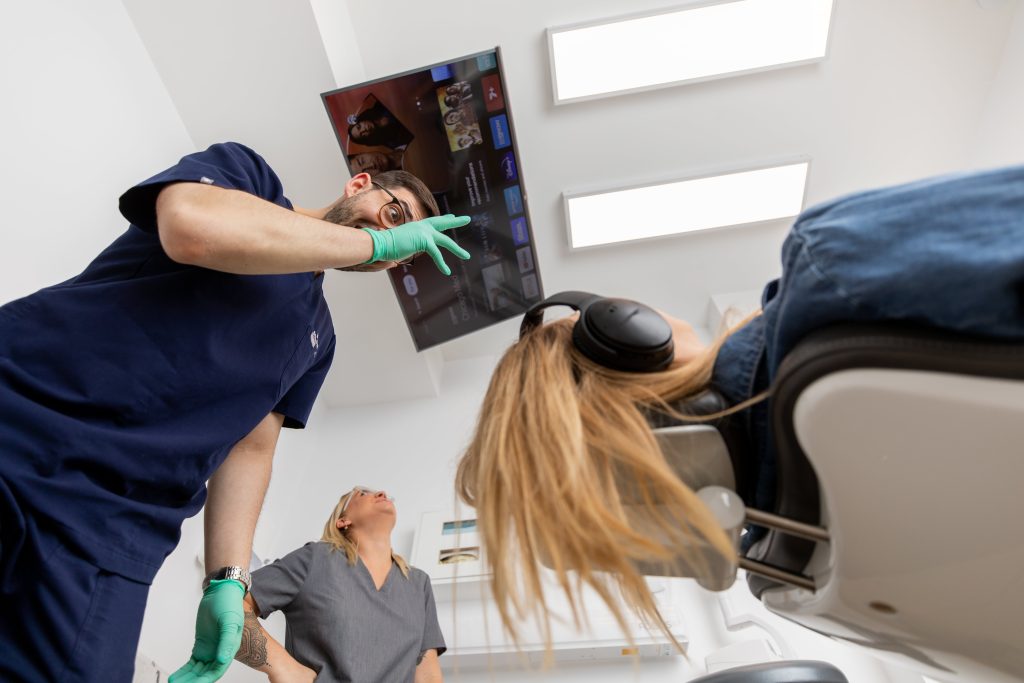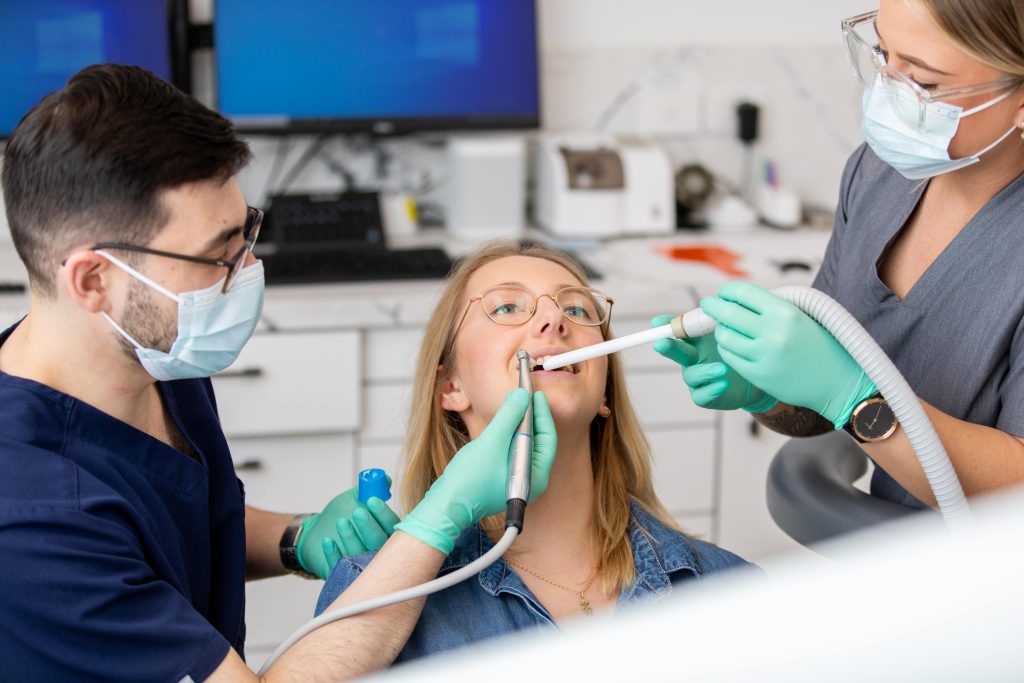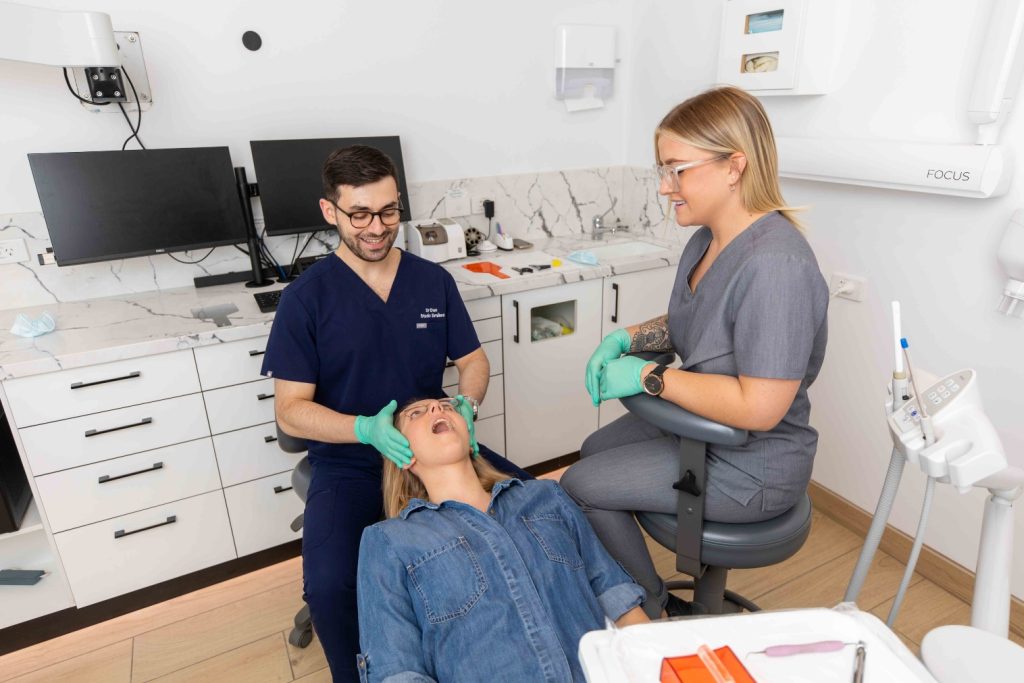General Dentistry
Cosmetic Dentistry
Dental Implants
Looking for a sleep dentistry clinic in Melbourne? Look no further than Studio Smiles. We offer a range of sleep general anaesthetic and sedation dentistry services to help you get the treatment you need without having to worry about being awake for the procedure. Whether you’re looking for general anesthesia, IV sedation, or oral sedation, we can help you get the care you need to feel comfortable and relaxed during your appointment. We understand that not everyone is comfortable with traditional dental procedures, which is why we offer a variety of options to meet your needs. Contact us today to learn more about our sleep and sedation dentistry services.

Different sedatives are used in sleep dentistry to help patients relax and reduce anxiety during dental procedures. Some common types include:
This form of sedation involves the administration of medication through a vein, typically in the arm. IV sedation induces deep relaxation, and patients often have little to no memory of the procedure. It allows for precise control of the sedation level throughout the treatment
Nitrous oxide is a mild sedative inhaled through a mask placed over the nose. It induces a state of relaxation and reduces anxiety during the dental procedure. Moreover, it acts quickly and wears off easily, allowing patients to resume their normal activities post treatment.
Oral sedation involves taking prescribed medications as pills or liquid before the dental procedure. These medications reduce anxiety and help patients feel more relaxed during treatment. The level of sedation can vary, from mild to moderate, depending on the medication and dosage.
This is the deepest form of sedation, typically administered in a hospital or surgical setting. It renders the patient unconscious and is primarily used for complex or lengthy procedures. An anaesthesiologist generally administers general anaesthesia, ensuring optimal safety and monitoring.
It’s important to note that the type of sedation used will depend on factors such as the patient’s medical history, the complexity of the procedure, and the dentist’s recommendation. Our dental team will evaluate each patient individually to determine the most appropriate and safe sedation option for their specific needs.
*As low as $160 after Medicare Rebate.
Suitable for:
*As low as $360 after Medicare rebate
Suitable for:
*As low as $800 after Medicare rebate.
Suitable for:
This is for a full in-house IV Sedation or General Anaesthetic administered by a specialist anaesthetist and anaesthetic nurses. Must have a Medicare card to be eligible for Medicare rebates. Medicare rebates between 20-80% of the procedure fee depending on the individual Medicare Safety Net Threshold which we can check for the patient after consultation and treatment plan has been developed. This includes a pre-operative consultation with anaesthetist and post-operative anaesthetic care. Done in-house at Studio Smiles. Can treat children from ages 3+.
The specific procedure for sleep dentistry can vary depending on the type of sedation used and the dental procedure being performed.
However, here is a general outline of what you can expect during a sleep dentistry appointment:
The process typically begins with a consultation where you discuss your dental needs, medical history, and any concerns or anxieties you may have. This allows our dental team to assess your suitability for sedation dentistry and determine the most appropriate sedation option for you.
On the day of the procedure, you will be prepared for sedation. This may involve taking prescribed medications if oral sedation is planned or placing an intravenous (IV) line for IV sedation. Our dental team will explain the sedation process, address any questions or concerns, and ensure you are comfortable.
Our dental team will closely monitor your signs throughout the procedure once the sedation is administered. This includes monitoring your heart rate, blood pressure, oxygen levels, and other relevant parameters to ensure your safety and well-being.
Once you are sedated and relaxed, we will begin with the wisdom teeth extraction procedure. You will not feel any pain and remain comfortable throughout, as the sedation will keep you relaxed.
After the dental procedure, you will be closely monitored until you wake up from the sedation. Our dental team will continue monitoring your vital signs and ensure you are recovering well.
Once you are fully awake, our team will provide you with post-procedure instructions. These may include guidelines on diet, oral hygiene, pain management, and any necessary follow-up appointments.

Dental fear is a very real thing, and it affects many people. In fact, studies show that as many as one in four Australians avoid going to the dentist because of anxiety or fear. Sedation dentistry can be a helpful solution for people who struggle with dental anxiety. At our Melbourne sleep dentistry clinic, we offer a variety of sedation options that can help to make your dental experience more comfortable. Nitrous oxide, for example, is a gas that can help you to feel relaxed during your treatment. Oral sedation, which is taken in pill form, is another option that can help you to feel more at ease during your appointment. And IV sedation, which is administered through a vein in your arm, can help you to achieve a deep level of relaxation. If you have been avoiding the dentist because of fear or anxiety, sedation dentistry may be the solution for you. Don’t let dental fear keep you from getting the care you need. Contact our Melbourne sleep dentistry clinic today to learn more about our sedation options.
Sleep dentistry offers several advantages for patients who experience dental anxiety or require complex dental procedures. Some of the key benefits of sleep dentistry include:

Sleep dentistry alleviates dental anxiety and fear. The sedation induces deep relaxation, helping patients feel calm and at ease during their dental visit. This enables individuals who may otherwise avoid or delay necessary dental care to receive treatment comfortably.
Sleep dentistry ensures a more comfortable experience for patients. The sedation minimises any pain or discomfort associated with the teeth extraction procedure, allowing the dentist to work efficiently and without interruption. Patients often have little to no memory of the procedure, contributing to a more pleasant experience.
Complex or lengthy dental procedures can be completed more efficiently with sleep dentistry. The sedation allows the dentist to work without interruptions caused by patient anxiety or discomfort. This can reduce the number of appointments required and minimise overall treatment time.
Dentists can perform their work with greater precision and accuracy when patients are relaxed and cooperative. Sleep dentistry ensures that patients remain still and calm, providing the dental team with optimal conditions to deliver high-quality care and achieve optimal treatment outcomes.
The sedation used in sleep dentistry often results in patients having little to no memory of the procedure. This can be particularly beneficial for individuals with dental phobias or traumatic dental experiences, as it helps minimise any negative associations or lingering fears associated with the treatment.
It’s essential to consult with our qualified dental professional to determine if sleep dentistry is suitable for your specific needs. We will evaluate your medical history, discuss the advantages and considerations, and help you make an informed decision. If you have been delaying your wisdom teeth extraction for a while, it’s time to speak to us about your sleep dentistry options. We are here to help our clients residing in Highett, Sandringham, Cheltenham & surrounding suburbs to undergo teeth extraction comfortable with sleep dentistry. Call us today.
Dental surgery can be a daunting prospect for many people, particularly if they have a fear of needles or are worried about the pain. Fortunately, there are now a number of options available to help make the experience more comfortable, including sleep dentistry and general anaesthetic. But what exactly is the difference between these two types of anaesthesia? Sleep dentistry, also known as sedation dentistry, involves the use of medication to help patients relax during their procedure. The medication is administered through an IV, and it works to create a sense of drowsiness and calm. As a result, patients may not be completely asleep during the procedure, but they will be in a state of deep relaxation and will likely not remember much about their experience afterwards. General anaesthetic, on the other hand, is designed to put patients into a state of complete unconsciousness. This means that they will not be able to feel any pain or discomfort during their dental surgery. General anaesthetic is typically used for more complex procedures, or for patients who have a high level of anxiety. Both sleep dentistry and general anaesthesia are generally safe and effective ways to manage dental anxiety and ensure a comfortable experience. Talk to our dentists about which option would be best for you and your procedure.
At Studio Smiles, we understand that many of our patients are nervous about undergoing dental procedures. That’s why we offer a variety of sedation options, including general anaesthesia. With general anaesthesia, you’ll be completely unaware of the procedure and will wake up with little or no memory of it. That means you can relax and let us take care of your smile. Best of all, we offer this service at a very competitive price. So if you’re looking for a stress-free way to improve your smile, call us today to find out more about our dental implants under general anaesthesia.
The cost of sleep dentistry can vary depending on factors such as the type of sedation used, the complexity of the dental procedure, and the dental clinic’s location. It is advisable to consult with a dental provider for an accurate cost estimate.
Sleep dentistry, also known as sedation dentistry, is a dental practice that involves sedative medications to help patients relax and remain calm during dental procedures. It benefits patients with dental anxiety or those undergoing lengthy or complex treatments.
The cost of wisdom teeth extraction with sleep dentistry can vary depending on several factors, such as the complexity of the procedure, the type of sedation used, and the dentist’s fees. Generally, sleep dentistry adds cost to the overall procedure due to the use of sedative medications and the presence of an anaesthesiologist or nurse anaesthetist. It is best to consult your dentist or oral surgeon for an accurate cost estimate.
Yes, dentists can use sedation techniques to help patients relax and even induce sleep during dental procedures. This is commonly referred to as sleep dentistry or sedation dentistry. Different levels of sedation can be used, ranging from mild relaxation to deep sedation or general anaesthesia, depending on the patient’s needs and the procedure’s complexity.
Sleep dentistry, or sedation dentistry, is beneficial for individuals with dental anxiety, hypersensitive gag reflex, special needs, or needle phobia. Eligibility is determined case-by-case based on health and medical history, assessed by a qualified dentist.
After sleep dentistry, patients may experience drowsiness, dizziness, and temporary side effects like dry mouth or a sore throat. Rest and follow post-operative instructions provided by the dentist. Recovery time varies; some feel back to normal within hours, while others may require a day or two. Consult your dentist for personalised guidance.
The duration of sedation varies based on the type and dosage of medication. Mild to moderate sedation typically wears off within a few hours, while deep sedation or general anaesthesia effects can last longer. Individual factors like age and health also influence the duration.
The coverage of sleep or sedation dentistry by dental insurance can vary depending on the specific insurance plan and the reason for undergoing sedation. Some dental insurance plans may provide partial or complete coverage for sedation in certain situations, such as for complex procedures or patients with specific medical conditions. However, coverage limitations and requirements vary, and it’s essential to check with your dental insurance provider to understand the specifics of your plan’s coverage for sleep dentistry. Additionally, it may be necessary to provide documentation from your dentist or oral surgeon regarding the medical necessity of sedation for your treatment.
Cost considerations for sleep dentistry include the type of sedation used, procedure duration, dental insurance coverage, additional fees for anaesthesia providers, and dental professional fees. Consult with your dentist to understand the costs involved and explore payment options.
To prepare for a sleep dentistry procedure:
No, it is not recommended to drive yourself home after sleep dentistry. The effects of sedation can impair your coordination, judgment, and reaction time, making it unsafe to operate a vehicle. It is advised to have a responsible adult accompany you to the appointment and drive you back home after the procedure.
Alternatives to sleep dentistry for dental anxiety or phobia include behavioural techniques, distraction techniques, and cognitive-behavioural therapy (CBT). Discuss your anxiety with your dentist to determine the best option for you.
There are several different types of medication that can be used for sedation dentistry, including oral conscious sedation (a pill taken before the appointment), IV sedation (medication given through an IV), and nitrous oxide (laughing gas). The type of sedation that is right for you will depend on your individual needs and preferences.
If you’ve ever had a dental procedure, you know that it can be quite uncomfortable. Whether it’s a simple cleaning or a more invasive procedure, most people would prefer to avoid the dentist if they could. However, for some people, going to the dentist is an absolute nightmare. The thought of sitting in the chair and having someone poking around in their mouth is enough to send them into a panic. For these people, sleep dentistry may be the answer. Sleep dentistry usually involves the administration of medication that will make the patient drowsy. The medication can be given through an IV, pill, or inhaled gas. Once the patient is
sedated, the dentist can proceed with the procedure. Sleep dentistry is often used for patients who have severe dental anxiety or who need to have multiple procedures done at one time. It’s also sometimes used for children who are too young to sit still for a dental procedure. If you’re considering sleep dentistry for yourself or your child, talk to your dentist to see if it’s right for you.
Sleep dentistry can be beneficial for patients who are anxious about dental procedures, have a fear of needles, or have sensitive teeth. It can also be helpful for patients who need to have multiple procedures done at one time.
Sleep dentistry is very safe when performed by a qualified professional. The medications used are typically very mild and will not cause any long-term side effects. Patients are closely monitored throughout the procedure to ensure that they remain safe and comfortable.